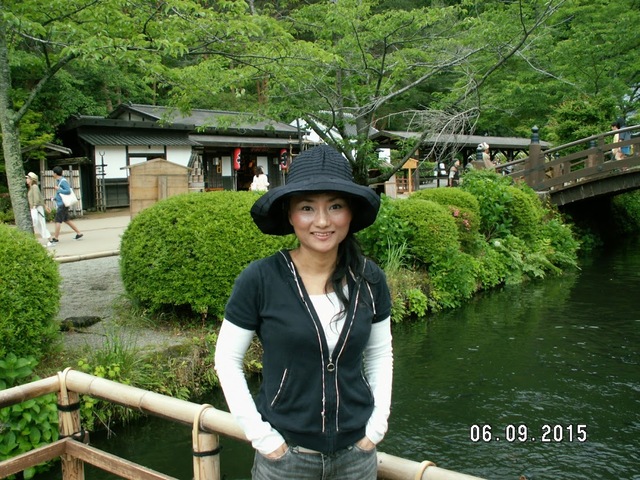
Why am I willing to translate the master Minami Jikisai’s books?
Why would I be an appropriate translator for his books?
These two questions capture my present circumstance
also my past and future.
If I divide my lifetime into three terms that I have lived so far,
At South Korea as the first one-third,
The midterm of one-third is at Japan,
The remaining one-third is currently in US
and here I am trying to undergo as my progress.
At the time when I got throughout those two terms,
I have cleared all the tasks that I imposed on myself.
Also, I was able to satisfy my own self
with academic background, financial capability, career.
There is no unfinished job left.
Since I imposed tasks on myself that can be achieved by effort,
I steadily went through all the stages to clear the tasks
proceeding cautiously, taking enough time to complete it properly.
However, when I have climbed up to the achievement
which was set by myself as a goal.
At the top I was able to look over the way I have walked,
and I saw completing task was not the final destination.
I found that the way I have been through linked to another road
which should take to path.
I have used up my two-third life terms
which was given just for satisfying myself personally,
but it is merely an act of satisfying hunger.
As hunger or thirst satisfied as it is fulfilled,
there would be demanding if supply required,
so that the causality gets done.
When self-supply was required in my life,
I settled with the self-demanding
so that the cause and result was done.
The emerging problem
was no directivity in my mind
when after causality has solved and settled.
As the way an effort loses basis without purpose,
it gets sorted out naturally,
also my mind without destination was
unable to find reason to do effort.
At that time, unexpectedly
I encountered with Minami Jikisaiwho is as a master
and the way of living his life.
And it made me define the direction of my effort
as it should be, over rest of my life.
If so, why not others but Minami Jikisai?
My answer for this question is,
there is no other proper linguistic expressions,
but only I can say this:
'I did not decide particular reason to be answered'
There is no theorized reason but surely there was an intuition.
The intuition was grounded on following facts that
expressed by the words he uses.
The giving off words from him are alive.
His linguistic ability can bring back died words to alive.
His persuasiveness can break down stereotypes
and also includes capability of being excused of it.
His using words have an ability to grind something hard.
His words are as a tool to pursue and he is using the tool fairly.
These intuitions inspired by him that I am going to prove,
maybe it must be my next task that should be done.
Why should the translator of his books be me?
For this question I have not determined an answer.
But I have an assurance that
I would not let his living words die with English transforming.
Even though it is also just a gut….





























As you may know, Guru refers to a yoga teacher,
In the world of computers, excellent hackers are respected and called as"Guru"
Linus Torvalds, the creator of the Linux kernel, is said to be "Guru".
Does Master pass as paraphrase as a good leader in the United States?
But as you mentioned a guru limited in a specific category such as branch or a tributary(傍流)
and it includes narrower capacity than a master's wider capability.
Also, a paraphrase is different from meta-phrase for the view of genealogy or legitimate line as a conveyance way.
As for me, I prefer to be meta-phrase style than transforming into a personal view point.
I also assume that a guru does not mean to a good leader.
In well known usage, a guru represents a cult group leader which sounded a dangerous person.
But you pointed out very well to make sure the meaning of 'master'.
I tried hard to search an equivalence word of a master but found out there is not enough choice for the word of 師.
Actually there is a word mentor, it means a personal tutor or a respectful teacher but it does not include the factor of accepting widely by followers.
That is why I use master and I assume most of English speakers can distinguish between a guru and a master.
渡る→亘るの訂正提案、ありがたく受取りました。
他に、誤字などのの至らないところがありましたら
指摘ほどお願いします。
どうも気になって仕方がないのですが、何故、
Why is it that it must be me?でなくて
Why is it must be me?なのでしょうか?
又は、Why must it be me?にしないのですか。
一つの文章にitや thatの指示代名詞の重複を避けるためです。
ですが、
>Why must it be me?のほうがスムースに聞こえますね。
余裕があった時は若干の布施をしたことがありました。
ある曹洞宗のお寺に一泊坐禅修行をしてもらって
決まった料金以上の布施を残してきたら
その余分を返却された時もありましたね。
特に決まりがなければ払わなくてもよいのでしょうかね。度々通うとなると費用もかさみますし、最初どうしたものかと迷うところではあるんですよね。
お金を話題にするのは誰でも気が進まないことですが、
それをはっきりしないと後でイザゴザが起きる原因になりますからね。
迷う前に確認なさったほうがよろしいかもです。
費用の決まりが無い場合は
私は自分ができるなんかの(お金以外の)お返しを
するようにしてました。
それも直接、担当者に確認してからでしたが。
曖昧に残すよりは確認できることはしてしまった方が後味すっきりすのではないかと。
>院代以外に、指導がシックリくる御坊さんはいましたか?
坐禅指導をしてくださった全員、それなりに
シッカリした教えを頂きましたが、
院代のほうが明確、しっくり、じっくり感ありました。
他の【しっかり感】の教え方は
教えてくださった方の名前を覚えるほどまで発展しなかったです。